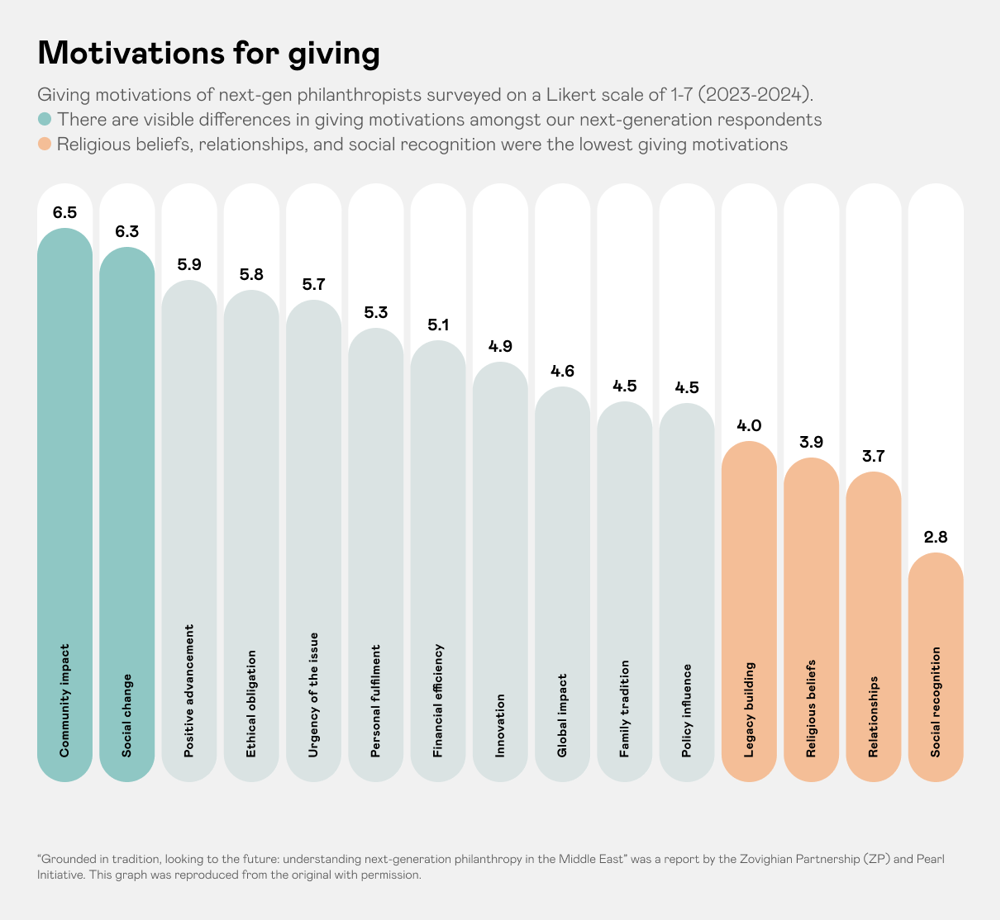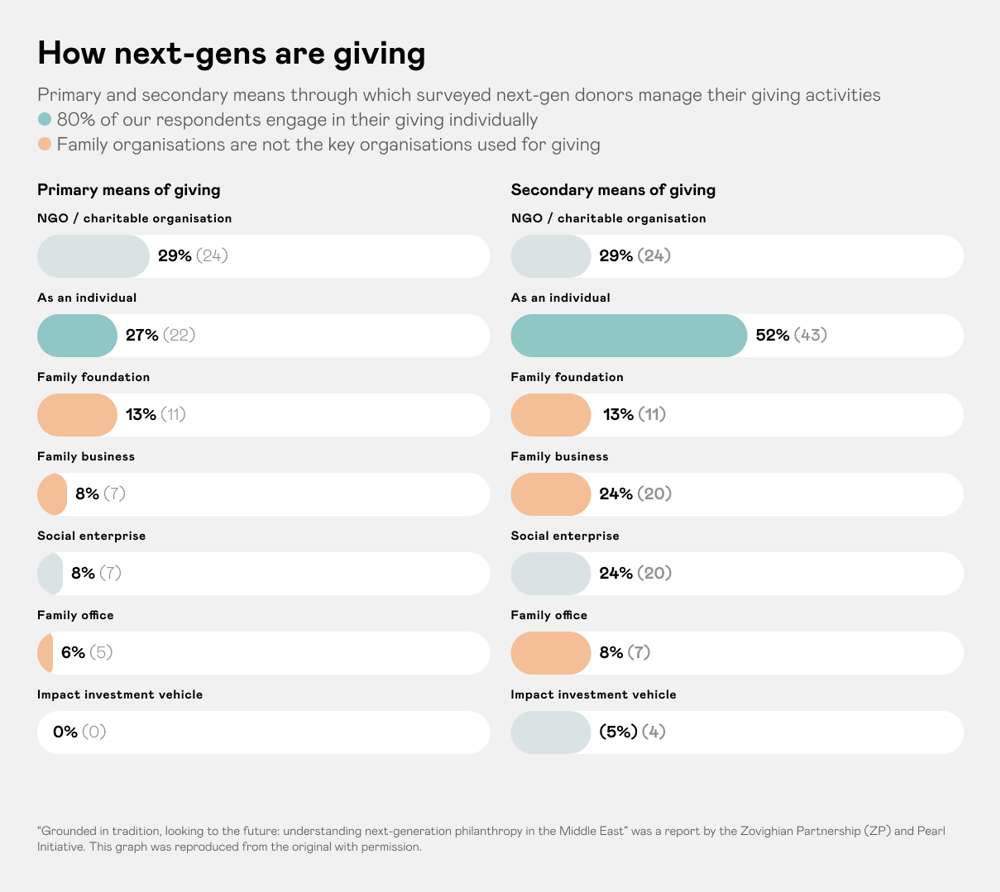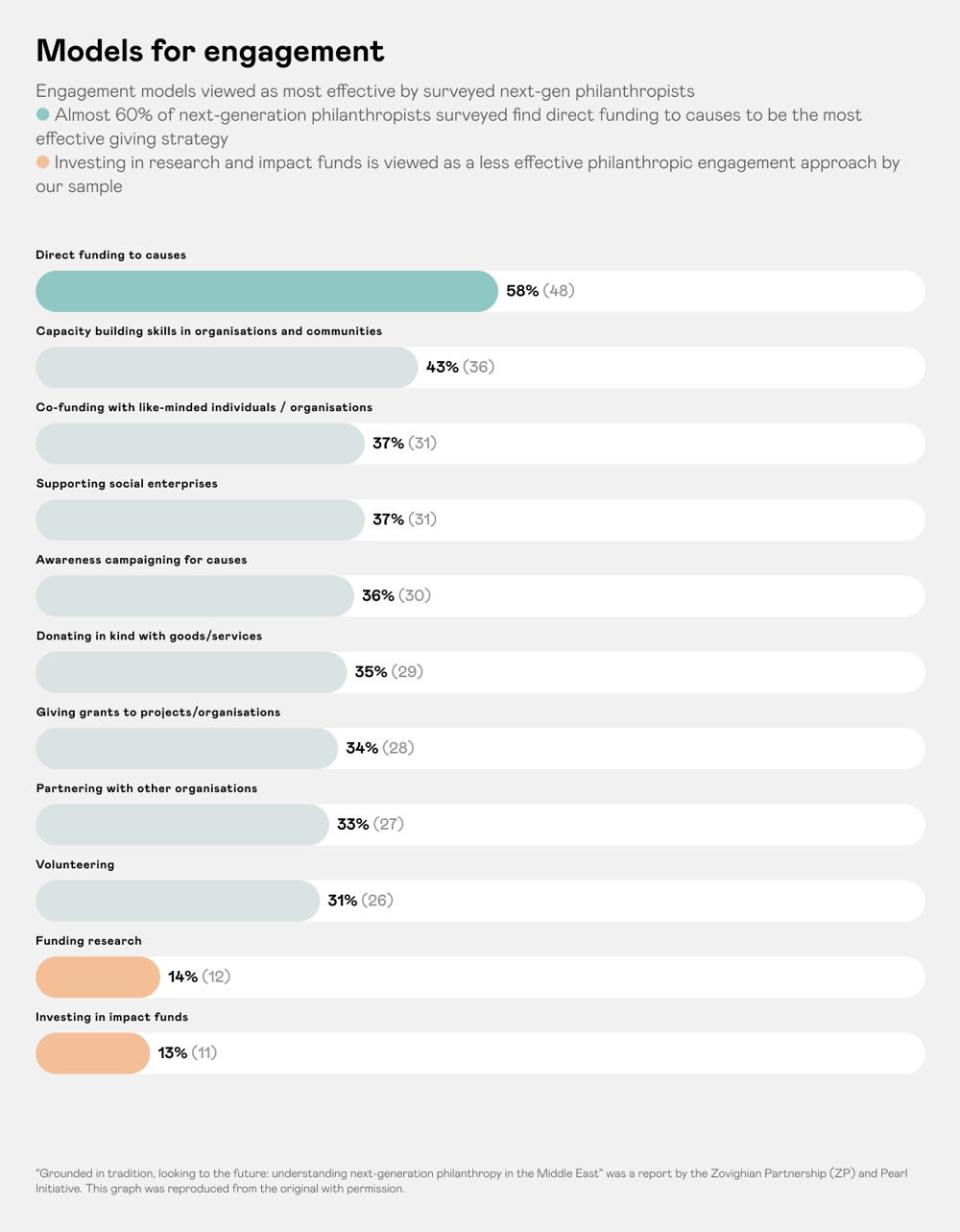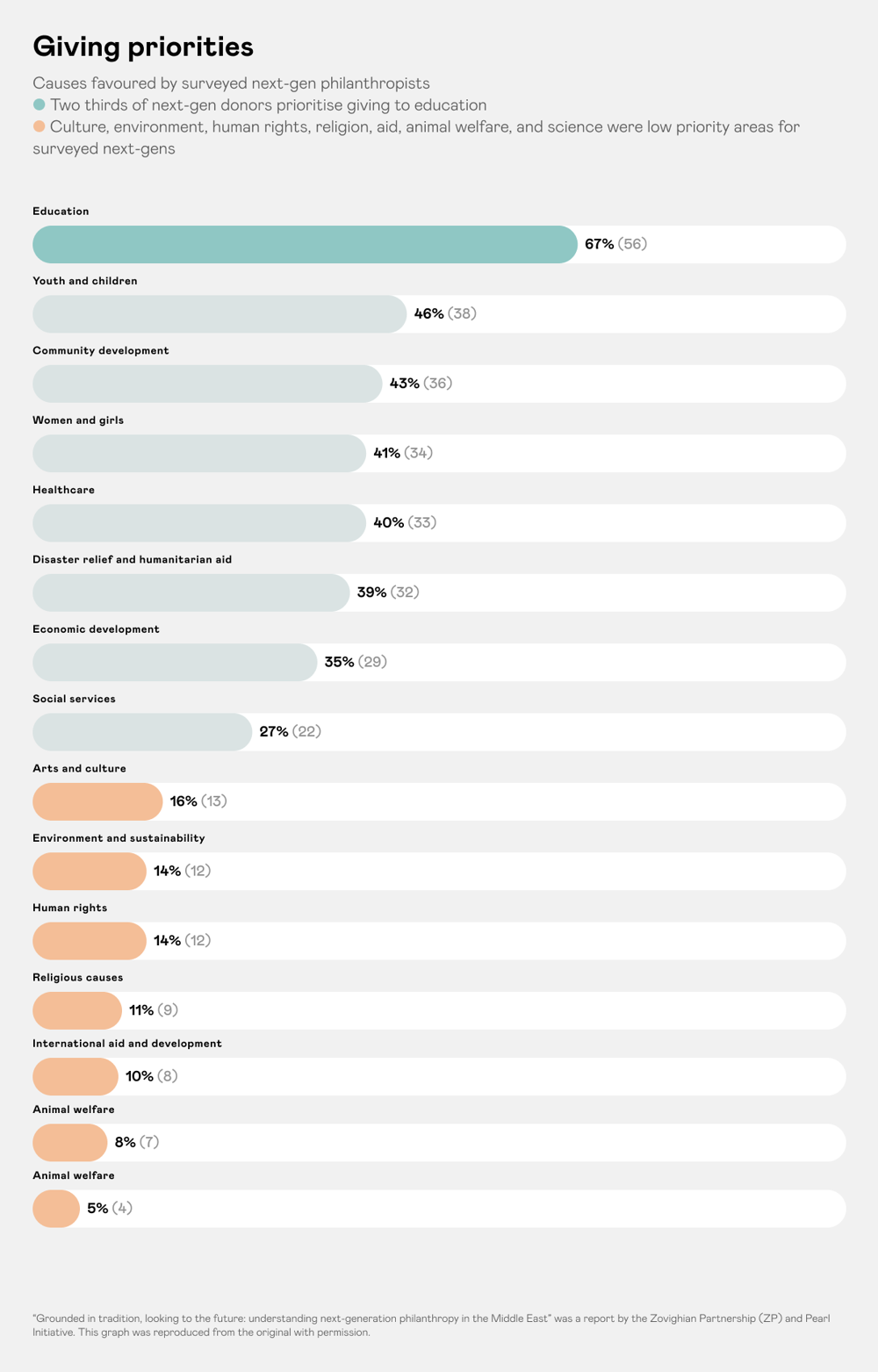فهم الجيل القادم
تستكشف البيانات الجديدة من شراكة زوفيغيان ومبادرة بيرل ما يحفز الجيل القادم من المانحين في الأقليم كما تكشف الأولويات والتحديات والعقبات

تستكشف البيانات الجديدة من شراكة زوفيغيان ومبادرة بيرل ما يحفز الجيل القادم من المانحين في الأقليم كما تكشف الأولويات والتحديات والعقبات

Philanthropy, derived from the Greek words “philos,” meaning love, and “anthropos,” meaning humanity, has long been a cornerstone of human civilization, reflecting a deep- rooted desire to aid those in need, support collective welfare, foster societal progress, and address pressing challenges.
This love for humanity manifests in important customs and practices in the Middle East that are not only grounded in Arab culture and the Islamic faith, but also shaped by the diversity of other religious communities, ethnic groups, and nationalities that call the region home.
Moreover, the region’s rich tradition of family and community support has fostered a unique philanthropic environment that emphasizes personal responsibility towards the protection and advancement of people and planet.
The Middle East is witnessing a new generation of leaders, givers, doers, and thinkers who have an extraordinary potential to reshape the region. They are honoring tradition while embracing strategic thinking and social innovation to address systemic challenges and unlock new opportunities.
With many already established in their philanthropic journeys and others just starting out, these changemakers are seeking to achieve lasting impact by unleashing the power of community, collaboration, and technology. Their expansive fleet of change-making vehicles includes their own personal initiatives and entrepreneurial ventures, family foundations, family businesses, and family offices.
Many are well-positioned to redefine private-public sector and private-philanthropic sector partnerships. They are investing in multiple personal and collective priorities, from education, healthcare, and the climate crisis to women, youth, and development, with a commitment to making a difference locally, regionally, and globally.
However, our understanding of next-generation giving remains limited. There is little research and data available in Arabic and English, and much of that is anecdotal and case-study specific.
This research report is a strategic response to this dearth of data and aims to build a more detailed and evidence-based understanding of next-generation philanthropy in the region, including its unique drivers, complexities, and potential to shape the future of giving.
Our results demonstrate that the significance of next-generation philanthropy in the Middle East extends beyond regional borders and can help anchor new global practices and outcomes in socio-economic development, impact sustainability, and beyond.
This survey employed a mix of question types, from closed-ended questions that could be answered on a Likert scale of 1 to 7, to more open-ended questions invited respondents to articulate their thoughts in their own words. The survey was developed in English but then translated into Arabic and was rigorously reviewed for clarity, cultural relevance, and consistency across both language editions.
Interviewees were chosen from a pool of young philanthropists, investors, and social entrepreneurs. All 83 respondents are from or are based in the Gulf Cooperation Council (GCC) countries, the Levant or Egypt, and some are based in North America and Europe. The top three represented countries were: the United Arab Emirates (27 percent), the Kingdom of Saudi Arabia (24 percent, and Lebanon (22 percent).
Researchers employed a dual approach in the data analysis. Using descriptive statistics, they first summarized the dataset to identify underlying patterns to achieve a macro-level understanding of the responses. They then used inferential statistics to investigate relationships between variables, assess the influence of different factors on philanthropic behaviors, and identify significant trends and patterns.
Limitations
Given the limited, albeit growing, number of next-gen philanthropists in the Middle East, the report authors note that the sample is restricted to individuals who were willing to answer an intimate and detailed survey.
Since a higher number of females opted to participate in the survey, findings that reference a gender lens or women-specific behaviors and interests were stress-tested to avoid a gender skew.
Despite the diversity of the respondents, it cannot be assumed that the findings of this research project are fully representative of the next-gen philanthropic community in the region, but the data does offer both a meaningful window into this sector and critical insights into where additional research will be useful.
Next-gen philanthropists surveyed place high value on integrity in their philanthropic practices, followed closely by empowerment, compassion, sustainability, and transparency. They are primarily driven by community needs. Family giving and cultural influence are only tangently affecting their giving decisions. Although religious beliefs scored low as a giving motivator, our correlation analysis uncovers its underlying nature in next-generation decision making.

Contrary to the belief that philanthropy in the region is driven by family foundations and family offices, 80 percent of surveyed next-gen givers are engaging in their philanthropy personally and individually. Nearly 30 percent are using their nonprofit organisations as both primary and secondary giving vehicles.
Almost 40 percent of our sample of next-generation philanthropists direct their philanthropy nationally. Fewer than 20 percent focus on local giving, and almost 30 percent support global causes.

Although giving for the surveyed next-gen philanthropists is very personal and individually-driven, 43 percent of respondents include family members in their philanthropic decision making.
While respondents are very driven by community need, the data reveals that they do not often consult community leaders (27 percent) and beneficiaries (25 percent). However, 55 percent primarily rely on information from beneficiaries, while others consult community reports and fellow philanthropists.
The majority of surveyed respondents trust their fellow philanthropists, as well as NGO leaders and beneficiaries, and trust online resources and support groups the least. While nearly 50 percent of respondents report having well-established philanthropy governance frameworks, more than half acknowledge that their governance is less established.
Over 70 percent shared that they have a strong commitment to self-accountability. Over 35 percent of next-gen givers find co-funding to be impactful and almost 35 percent believe that partnering with other organisations is an effective giving strategy.
Nonetheless, 28 percent of respondents have not yet collborated with other philanthropists. Despite this positive outlook towards collaboration, 42 percent perceive collaboration with peers as less effective compared to the sample average.
More than two thirds of participants are dissatisfied with the available ecosystem supporting philanthropic giving. However, the same percentage holds a positive perception of the impact of philanthropy in the Middle East over the next five years.

Over 65 percent of surveyed next-gen philanthropists consider education to be a top philanthropic priority in their giving efforts. A higher commitment to accountability and higher annual budgets correlates with funding education. Female philanthropists in the sample show a distinctive pattern of giving to empower women and girls. This teaches us that boards and teams that do not have women members are markedly less likely to invest in this sector.
Giving preferences towards youth and children are influenced by family, cultural, and traditional values. Sectors such as culture, environment, and science and technology are lower priority for this sample of next-genphilanthropists, uncovering potential funding gaps in the region.

Next-gen philanthropists in the Middle East are thirsty for a more effective and dynamic philanthropic ecosystem, and their interests in individual philanthropy and innovative giving methods are opportunities for growth.
Developing structured and accessible resources and platforms that are responsive to the needs and interests of these highly motivated next-gen donors is imperative if we are to unleash the power of this cohort.
Building organisational capacity to increase accountability standards can help enable more ethical, transparent, and impactful giving across the Middle East and beyond.
Tailoring these tools to the giving priorities and needs identified in this research – from direct funding to impact investing and trusted collaborative initiatives – can empower our next-gen givers to make more informed, impactful decisions.
Bridging the gaps between data, communities, funding, and decision making will change the course of philanthropy in the region. Enhancing mechanisms for direct community participation and evidence-centered decision making, as well as supporting the leadership growth and personal development of next-generation givers is critical.
Bringing next-gen philanthropists closer to the communities they serve and fostering a regional philanthropic culture that encourages effective peer-based collaboration will help maximise impact. Family ventures that bring in the leadership, vision, and skill set of their next-gen will be able to establish new-found opportunities for impact and lasting positive change.
Achieving this will build a more adaptable and resilient philanthropic sector that can address our contemporary challenges and complexities, while staying rooted in enduring values.
While this research has illuminated emerging trends and practices shaping next-generation philanthropy, it also underscores the necessity for ongoing inquiry to deepen our understanding and enhance the impact of giving in the region.
The opportunities for further research are immense and relevant to today’s most urgent demands: better understanding the needs of next-generation givers; understanding how to increase the readiness of family institutions to bring in younger leaders; designing new governance and accountability frameworks to strengthen ethical engagement with community; and more.
About the report
Dr. Ramzi Abou Ismail and Lynn Zovighian were responsible for conducting the research and for authoring this report with guidance from, Anissa Punjani, Rebecca Riccio and the wider Pearl Initiative and Zovighian Partnership teams, including Sumaya Nair, Dima Toubaji, and Dahlia Bouri. The research was supported by the Bill & Melinda Gates Foundation.
The Pearl Initiative is a UAE-based nonprofit working to promote the business case for a corporate culture of accountability and transparency. Established in 2010 by regional business leaders, it has a dedicated Governance in Philanthropy programme and is a partner in Circle with Philanthropy Age.
The Zovighian Partnership, established in 2013, is a family-owned social investment platform that enable socio-economic advancement and sustainable collective impact in the Middle East. They manage a portfolio of impact missions that offer human and community-centered solutions for the Middle East. Their clients are philanthropists, social investors, and peace builders who are deeply grounded in humanity, have a true appreciation for R&D, innovation, and are fervently committed to brilliance that is Made in the Middle East.
It's a good idea to use a strong password that you're not using elsewhere.
Remember password? Login here
Our content is free but you need to subscribe to unlock full access to our site.
Already subscribed? Login here